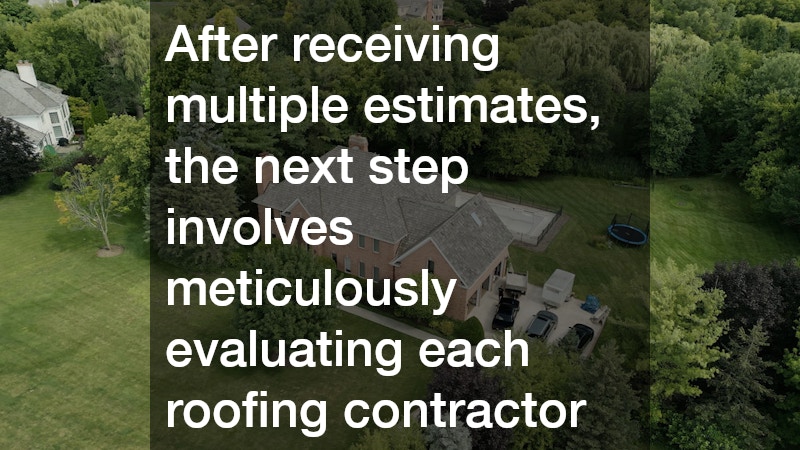When considering a roof replacement, it’s crucial to obtain multiple estimates. This approach allows homeowners to compare the services, pricing, and terms offered by various roofing contractors. With so many options available, selecting the right contractor can be overwhelming, but collecting multiple estimates simplifies this process.
By evaluating different proposals, homeowners can make informed decisions and ensure they’re receiving a fair price. Additionally, this strategy helps in identifying any outliers in pricing, which could indicate either a great deal or a potential scam.
Multiple estimates can also highlight the different approaches that contractors might take for the same project. Not every roofing contractor uses the same materials or techniques, and these nuances can impact both the cost and the quality of work. Furthermore, gaining a wide perspective from several contractors can provide insights into industry standards and best practices. Such knowledge empowers homeowners to ask pertinent questions and engage in more detailed discussions about the project. Consequently, the homeowner is better positioned to identify which contractor offers the best value based on a combination of cost, quality, and reliability.
One important fact to consider is that collecting estimates allows homeowners to verify the credibility and reputation of the roofing contractors they are considering. While some might focus on cost alone, it is vital to pay attention to credentials, insurance, and references, which can all be assessed during the estimate stage. Price should not be the sole determinant as the risk of compromise on quality poses a significant concern. It’s particularly relevant when some bids significantly undercut others, which might lead to subpar materials and workmanship. Thus, obtaining multiple estimates enables homeowners to not only select the best price but also ensure peace of mind regarding the quality and service level they will receive.
How to Evaluate Roofing Contractors
After receiving multiple estimates, the next step involves meticulously evaluating each roofing contractor. This involves a comparative analysis of several factors such as the scope of work, pricing, and included warranties. Homeowners should take special care to ensure the scope of work outlines every detail, including timelines, materials, and policies on unexpected issues. This clarity prevents any misunderstandings or conflicts that may arise during the project. Thorough evaluation ensures that the selected contractor meets the homeowner’s specific needs and delivers the project with professionalism and precision.
Moreover, evaluating the experience and expertise of the roofing contractors is important. Experienced contractors often have proven track records which can be verified through references and reviews. These testimonials provide real-world insights into the contractor’s reliability and quality of work. On the other hand, newer contractors might offer competitive pricing but lack the extensive experience needed for complex tasks. Balancing the benefits of experience with cost considerations is crucial to making a satisfactory decision.
Insurance and licensing are also pivotal aspects of a contractor’s evaluation. Ensuring that the roofing contractor possesses the necessary licenses and insurance prevents potential legal and financial headaches. A legitimate contractor will typically provide proof of their credentials without hesitation. In addition to protecting the homeowner, insurance also protects the workers and ensures that the homeowner is not liable for on-site injuries or accidents. Verifying a contractor’s insurance and licenses is a simple yet vital step in the evaluation process.
When to Stop Getting Estimates
While gathering estimates is essential, knowing when to stop is equally important. A recommended practice is obtaining three to five estimates, which usually offers a comprehensive understanding of market pricing and service variations. More than five estimates may lead to confusion, making it challenging to distinguish between minor details of proposals. Conversely, fewer than three estimates may not provide a sufficient comparison, which undermines the goal of obtaining multiple perspectives. Stopping at the right number of estimates ensures a balanced, informed decision-making process without unnecessary complications.
Trust is a key factor in deciding when to stop acquiring more estimates. Once a homeowner identifies a contractor that aligns with their expectations in terms of communication, pricing, and services, further estimates may not be necessary. A contractor that builds trust through transparency and professionalism often indicates that they value the homeowner’s satisfaction as much as the project itself. In situations where a proposal meets needs and establishes trust, the decision to halt further estimates can be confidently made. This ultimately brings peace of mind and satisfaction in choosing a contractor who seems genuinely committed to delivering quality service.
However, if none of the contractors meet the homeowner’s criteria, it could be beneficial to seek additional estimates until a suitable choice is found. Nonetheless, it’s crucial to remain within reasonable limits to avoid becoming overwhelmed. Preferences, budgets, and timelines are unique to each homeowner, so ultimately, the right moment to stop gathering estimates is subjective and varies case by case. Judicious analysis and a balanced approach are key to achieving the objective of selecting the best contractor for the roof replacement project. By carefully choosing when to stop the process, homeowners can make decisions confidently and wisely.

